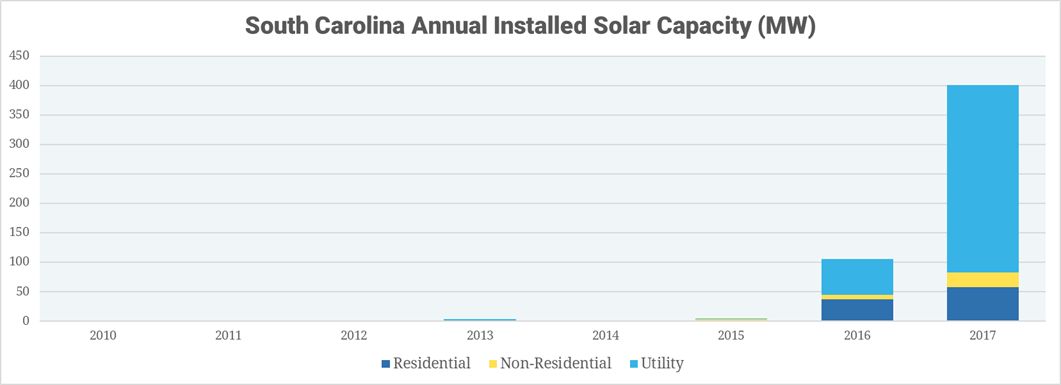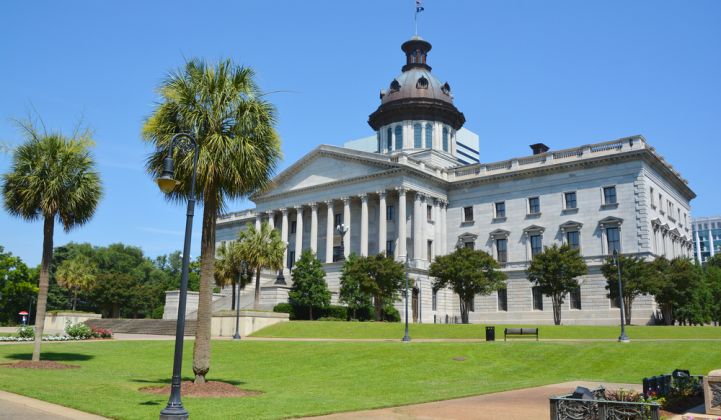As solar companies feared, South Carolina’s rooftop solar market is slowing down as utilities in the state begin to hit their net metering caps.
Last week, Duke Energy Carolinas (DEC) announced that it has reached its 2 percent cap for net-metered solar systems in upstate South Carolina. The utility says more than 5,000 solar systems have been installed by homes and businesses in its territory to date.
“In order to give advance notice to DEC customers who are installing solar, we will continue to accept net metering applications through the end of July,” the utility wrote in a July 11 communication. Any customers interested in participating in the net metering program must submit an interconnection application by end of day on July 31.
Beginning August 1, any DEC customers interested in participating in customer-owned generation can utilize the Purchase Power Tariff. Under this program, customers can sell the excess electricity they produce to Duke Energy at the same price the utility pays for electricity generated by large solar power plants.
Retail-rate net metering was introduced in South Carolina as part of a landmark energy bill passed in 2014, known as Act 236. Retail-rate net metering, an important incentive for driving rooftop solar growth, was a key part of a larger settlement agreement between the solar industry, environmental groups and South Carolina's utilities.
The state’s solar market has grown exponentially since the legislation took effect. Last year, South Carolina’s solar market ranked 18th in the nation, from having been virtually nonexistent two year prior. At the end of 2017, there were more than 100 megawatts of residential solar deployed in the state.
To maintain that growth, solar companies are hoping they can reach a compromise deal with lawmakers and utilities for when the state legislature comes back in session in January.
Net metering limits approach
Now that net metering has run out in DEC territory, solar companies say South Carolina’s solar market and solar jobs are at risk. For the solar installers upstate, "It’s going to be hard,” said Tyson Grinstead, director of public policy at Sunrun.
Sunrun isn’t prepared to make any announcements about pulling back or closing up shop in South Carolina just yet. But in general, he said, “It will be hard to avoid job losses in the near term.”

Duke’s other South Carolina utility, Duke Energy Progress, still has some remaining capacity under its net metering cap. But there are conflicting accounts of how long the cap will last. The utility says it won’t reach the capacity limit until 2020 or later. But Sunrun says the cap could be reached much sooner.
According to Sunrun, there are currently 11.5 megawatts of net-metered solar available in Duke Energy Progress territory. There haven’t been many solar sales in that area to date, Grinstead admitted, but the industry’s focus could shift quickly to that region in light of DEC’s cap being reached.
In recent months, roughly 3 megawatts of distributed solar were being installed in DEC territory each month. If installs pick up the pace in Duke Energy Progress territory, the cap could be hit well before 2020.
South Carolina Electric & Gas is also approaching its net-metering cap, said Grinstead. Sunrun anticipates it will be hit by the end of the year, while the utility says there’s enough capacity to last until April or May of 2019.
Looking for a solution come January
Solar advocates nearly succeeded in avoiding the cap issue altogether. A provision to abolish the net metering limit was working its way through the state legislature earlier this year, when lawmakers used a technicality to remove the measure in April.
Net metering made its way back on the agenda in May, with a measure that would have increased the cap from 2 percent to 4 percent of peak demand. But in a last-minute shift, a budget bill conference committee removed that language last month, citing another technicality. Senate members argued the change violated Rule 24, which states that the legislature cannot make permanent law via a proviso in the state budget.
“It’s hard for me to see how a one-year extension changes permanent law, particularly when utilities can offer net metering above 2 percent if they choose — they just can’t get full cost recovery for it,” said Grinstead.
With the state legislature now out of session until January, solar companies are hoping they can work out a compromise with lawmakers and South Carolina utilities during the recess. That process has already begun, said Grinstead, with regulatory staff holding working group meetings each week.
“We have to hope that we can all get together to find a solution that keeps jobs in the state,” he said.
In the meantime, utilities could decide to offer some form of net metering — beyond the compensation offered to large-scale solar projects — as a show of “goodwill,” he added. But the solar industry's top priority is “making sure the long-term [issue] gets fixed and making sure the long-term policy offers customer choice.”




